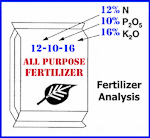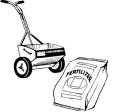 We don't FEED plants. We
provide nutrients so that the plants can make their own
food in a process called
photosynthesis. This is the key
thing that separates plants from animals.
We don't FEED plants. We
provide nutrients so that the plants can make their own
food in a process called
photosynthesis. This is the key
thing that separates plants from animals.
Plants need 17 nutrients
(elements) in order to grow properly. They need ten of
them at high levels (macro-nutrients or primary elements). Some are provided
in mineral form including
Nitrogen (N),
Phosphorus (P),
Potassium
(K),
Calcium (Ca),
Magnesium (Mg) and
Sulfur
(S). The remaining three are provided by the air and
water and include Hydrogen (H),
Oxygen (O) and
Carbon
(C).
The other 7 are still
vital but are only needed in small amounts
(micro-nutrients, minor elements, trace nutrients or
trace elements). This group includes
Boron (B),
Copper
(Cu), Chlorine (Cl),
Iron (Fe),
Manganese (Mn),
Molybdenum (Mo), and
Zinc (Zn).
 So, we know the nutrients
that plants need and there are several ways to provide
them. For most of us, the soil in our landscape is the
place where the nutrients reside waiting for the plant
roots to absorb them. Therefore, the structure and make
up of the soil is important to you.
Soil testing will
help you know what is going on down there out of sight.
So, we know the nutrients
that plants need and there are several ways to provide
them. For most of us, the soil in our landscape is the
place where the nutrients reside waiting for the plant
roots to absorb them. Therefore, the structure and make
up of the soil is important to you.
Soil testing will
help you know what is going on down there out of sight.
At times, we need to
supplement the amount of one or more elements in our
soil. Most commonly, this is done by application of a
fertilizer which comes in many forms including granular
and liquid.
Finally,
compost i.e. Brown Gold, is an extremely
important part of home gardening. This soil amendment
does not add many nutrients but it adds to the structure
of the soil and encourages organisms such as earthworms
and beneficial micro-organisms to thrive and multiply.
Listed below are some
topic pages on these important elements and
fertilizers
used in the home
landscape garden:



